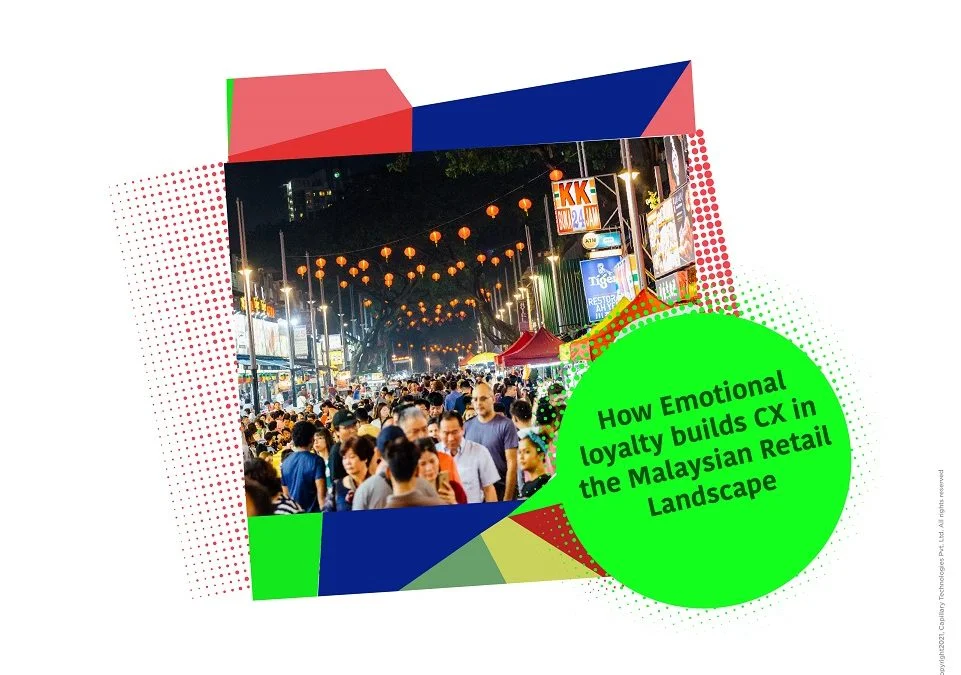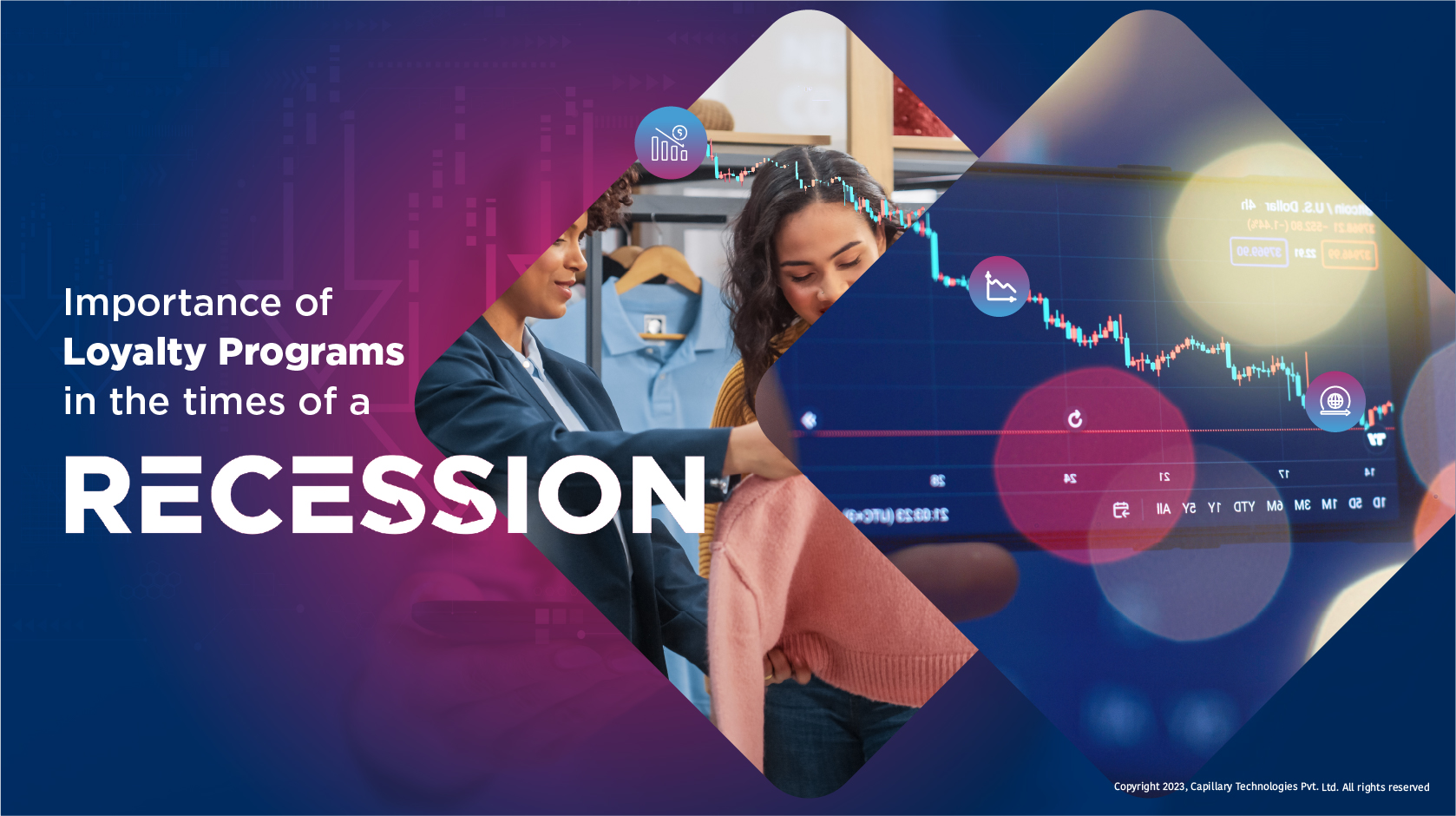- Design industry shaping loyalty programs
- Integrate easily and go live quicker
- Deliver hyper-personalized consumer experiences
Blue Rewards from Al Futtaim Group Shares Loyalty Success Stories and Evolution. Watch Podcast >
Capillary Announces 2nd Annual Captivate 2025 Summit: Transforming Loyalty Management with New AI Tech Read more >

When the pandemic began, the immediate customer trends showed a major dip in consumption. However, in the second half of 2020, a part of the overall spending bounced back, and studies showed that this uptick can be explained by consumers’ motivation to seek an external stimuli’. This helped them to feel better during lockdown restrictions. Another report by the Zeno group shows how Malaysians, amongst other Asians, did a lot of emotional consumption during the pandemic year. Consumption was driven by how much the customer agreed with a brand’s values. The survey also found that almost 91% of Malaysian consumers stopped buying from brands they disagree with.
With evidence of ‘cancel culture’ (practice of withdrawing support to a brand) and comfort buying during pandemic, it certainly seems like this is a crucial time for brands to appeal to customers through emotional loyalty.
Emotional loyalty aims to bring consumers closer to the brand by creating trust and belief in the brand’s vision. It involves understanding what the customer feels to create a personalized interaction with them – right from advertising up to the purchase of the product. Research by Forrester suggests that making customers feel appreciated that encourages them to spend more with a brand and recommend it to friends and family. This clearly shows that emotional loyalty is the easiest way to foster loyalty and retain customers through thick and thin. The Data and Marketing Association describes the ‘3Ps’ approach to achieve the best of emotional loyalty.
Partnerships: Brands must seek to create a partnership with the customer, to exchange valuable information with them. Examples of a good partnership includes rewarding certain behavior such as advocating for the brand, sharing feedback and product reviews.
Purpose: Loyalty programs must be connected to issues that resonate with the customers values. In recent pandemic times, health and sustainability have been important topics that concern a majority of the population. Initiatives related to these topics would play a role in capturing consumer attention.
Personalization: All loyalty programs would be incomplete without the element of personalization and emotional loyalty is no exception. Personalized communication and offers can make the customer feel special and included, and can lead to more repeat sales.
Let’s take a look at recent customer trends in Malaysia, which demonstrates how buyers warm up to brands that understand and share similar views with them. What does an average Malaysian consumer look for in their brands, apart from the product or service itself?
In Malaysia, there has been a year-on-year increase in Google searches like ’metal straw’, ’eco shop’ and ’hybrid car’, proving that consumers are very conscious about the environmental issues faced across the world and they want to do their part by choosing products that are sustainable and don’t harm the environment. Experts say that incorporating sustainable business strategies is an inevitable step towards the future, and it is best that retailers start planning for this as soon as possible. Brands can create an incredible journey towards sustainability and get customers to follow them along the way, and therefore building the buyer’s confidence in the products.
With 60% of its population practicing Islam, Malaysia is a major producer of halal goods in Asia. Halal is an Arabic word that means permitted by the Islamic law and it is commonly applied to food, pharmaceuticals and cosmetics. Therefore it is not a surprise that there was a 550% year-on-year growth for searches like ‘Toblerone halal and ‘Ovaltine halal‘. There is also major demand for halal cosmetics. This is a clear indicator that brands must respect religious beliefs, making consumers feel understood.
Much like all other countries, Malaysia has seen a lot of suffering during the pandemic, and people are looking for experiences that spark joy. In a non-pandemic scenario as well, positive experiences created by brands inspire trust and advocacy among customers. Buyers remember the brand for positive and optimistic marketing messages and they’re more likely to recommend products friends and family.
For example, KFC Malaysia launched the #KepciKitchen campaign in early 2020 to creatively engage customers. The brand encouraged customers to share photos of how they eat KFC chicken by giving them a chance to win delivery vouchers.
Expert views also suggest that familiar things make customers feel better, at a time of crisis. Therefore, making personalized recommendations and introducing localized goods can be favorable strategies to boost sales.
Adding on to the positive brand messaging, brands need to create meaningful contributions to causes that customers are involved in. The pandemic situation has brought the entire community together, and it’s an essential time for the brand to show up for the cause.
During the pandemic, popular home improvement store MR.DIY ran a donation campaign called ‘You Share, We Donate’. In this campaign, the brand aimed to encourage customers to share the company’s social media posts for a good cause – for every Facebook share of their short film, the company donated RM1 to the Malaysian Relief Agency.
There are many such examples from various brands, ranging from small stores to large conglomerates who have managed to build an optimistic brand image during tough times.
In the book ‘How Customers Think: Essential Insights into the Mind of the Market‘, author Gerald Zaltman demonstrates that 95% of purchasing decisions are made through unconscious urges. Therefore, all evidence is pointing to emotional loyalty being the fastest way to carve a niche in the consumer’s heart. As customer priorities in Malaysia shift, it is more important than ever for brands to leverage emotions in their rewards program. Find out how you can include emotional loyalty in your campaigns / brand emotional connection and loyalty campaigns by talking to an expert.

June 9, 2021 | 4 Min Read
When the pandemic began, the immediate customer trends showe

January 29, 2025 | 5 Min Read
During an economic downturn, retaining customers is more cru